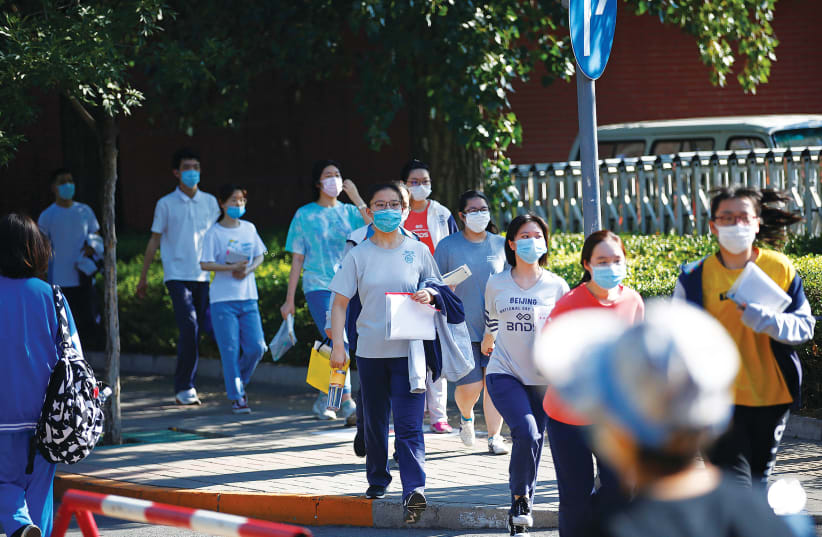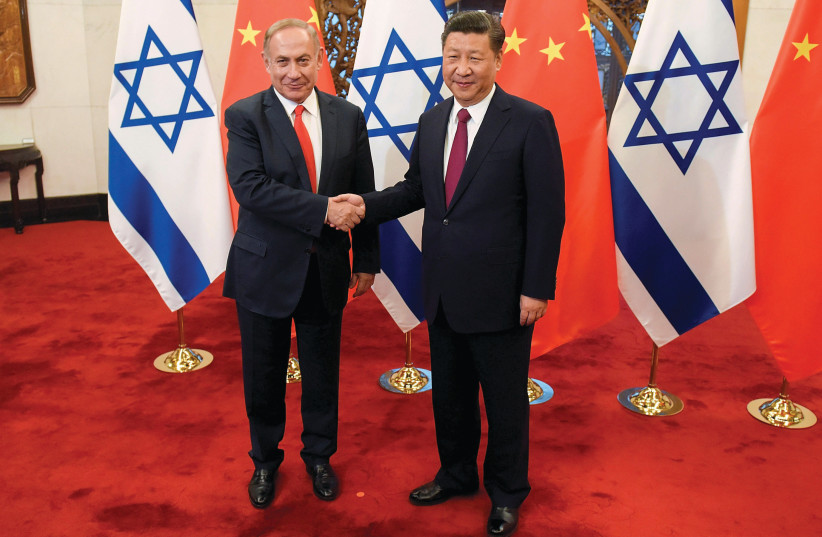The Chinese Communist Party has asked Chinese students in Israel to collect information on local media, part of a global trend of Beijing using students around the world to promote its interests.
An official asked students on multiple campuses in Israel to seek out and send Israeli media coverage of the Winter Olympics in Beijing, according to screenshots obtained by The Jerusalem Post.
The message ended with an encouraging message to the students, to keep up the good work in their Hebrew studies.
A researcher on Israel-China relations recounted being pressured by Chinese officials to try to place positive articles about the Olympics in Israeli media, including an offer of an all-expenses-paid trip to the games in Beijing.
The sources asked to be anonymous, for fear of retaliation. In addition, some Israeli experts in the field declined to comment, because they may be cut off from Chinese academics if they criticize the CCP.
There are currently several hundred Chinese students in Israel, but at their peak, before the COVID-19 pandemic, there were over 1,000, which is still far fewer than in places like the US, UK or Australia.
Pei Li, a postdoctoral researcher at UC Berkeley who previously studied at the Weizmann Institute, told news site Eurasianet that he could not trust other Chinese students: “You never know who will report you to the authorities.”
Pei recounted to Eurasianet that in 2020, an Indian researcher at Weizmann wrote a Facebook post criticizing China’s Cultural Revolution and blamed the CCP for spreading COVID-19. Some Chinese students reported the matter to the Chinese Embassy and launched a campaign for the Weizmann Institute to fire the researcher, which the university did not do.
The Weizmann Institute did not respond to a request for comment.
In 2018, the Chinese Embassy in Israel attempted to establish a China studies association, inviting and presenting awards only to researchers it saw fit and leaving out those whose research it disapproves of.
“Under the supervision and leadership of the Chinese government, you may be able to advance study of the Chinese language in Israel, and maybe some of Chinese culture, but not free and unbiased research,” Noam Urbach, then a lecturer on China at Bar-Ilan University, wrote in 2019. “As long as the subject of the research controls the research itself, the research will be plagued by propaganda.”
That is in addition to Confucius Institutes, an international educational and cultural chain, with chapters at the Hebrew University of Jerusalem and Tel Aviv University, which Urbach wrote is “a center for ‘annoyances’ and pressure from the Chinese on the university on various matters... usually around dealings with sensitive matters for China, such as the persecution of the Falun Gong, human rights in China, visits by the Dalai Lama and Taiwan.” Tel Aviv University eventually worked out the disagreements, Urbach wrote.
SEVERAL COUNTRIES have taken action in recent years after finding Chinese students who were involved in gathering intelligence on, and smuggling technology from, campuses. In addition, China continues to surveil students in other countries by leveraging WeChat groups, like the ones for students in Israel, for social pressure.
In 2019, FBI Director Christopher Wray warned that “the academic sector needs to be much more sophisticated and thoughtful about how others may exploit the very open, collaborative research environment that we have in this country, and revere in this country.”
Confucius Institutes are seen by academics as “nothing but agents of Chinese services to spy on Chinese students and hold them accountable,” Warner said. The US designated all Confucius Institutes as foreign missions in 2020.Human Rights Watch found last year, in a report focused on Australia, that the CCP is trying to influence academic discussions, monitor overseas students from China, censor scholarly inquiry, or otherwise interfere with academic freedom.”
The Australian government reviewed its foreign interference guidelines for universities, and plans to train students to identify and report it when they see it on campus.
Japanese universities tightened their background checks for foreign students researching dual-use technologies, that can be repurposed for the military, Kyodo News found in September.
CARICE WITTE, founder and executive director of the Sino-Israel Global Network and Academic Leadership, pointed out that China even has a government ministry called the United Front Work Department meant to influence Chinese abroad, and is open about considering them to be an asset supporting its policies. Mao Zedong even called United Front one of China’s “Three Magic Weapons,” after the CCP and the People’s Liberation Army.
Phenomena like asking students to track Israeli media is “extremely common,” Witte said.
“It’s an official top-down policy to enlist people who can be supportive, though Israel is not so familiar with it,” she explained.
In fact, Witte said, Chinese officials have a history of meeting with Israeli Diaspora ministers, thinking that they can learn from Israel’s ties to Diaspora Jewry.
Brig.-Gen. (ret.) Assaf Orion, director of the Israel-China Research Program at the Institute for National Security Studies, said that “China has a very wide view of the state and the Chinese nation. There is a saying by the general secretary [Chinese President Xi Jinping] that wherever they are, the sons and daughters of China are part of the nation. That implies an expectation from the approximately 60 million Chinese overseas to serve their ancestral land.”
That includes expecting students to represent the Chinese position and report “problematic” statements on topics that the CCP views as core interests of national security, like Taiwan, Hong Kong, Tibet, the Xinjiang Uighurs and Falun Gong, he said. They also network Chinese academics around the world through the Chinese Students and Scholars Association.
“China looks at academia as an important theater to influence discourse and to make sure students stay loyal. As research shows, it uses academic bodies and students as vectors of influence and to try to get technology through legal and less legal means,” Orion stated.
China’s determination to be involved in the way it is portrayed on campuses also has a “chilling effect” on academics, including Asian studies in Israel, he said.
Urbach criticized Chinese academics who hesitate to make public comments that may not jibe with the CCP’s official line.
“The fact that there are people who work for Israeli universities, funded by the Education Ministry, who are worried about speaking about current events related to their area of research is shameful,” he said. “They know the Chinese are tracking them and get angry if they don’t say the right things or if they use the wrong word. That’s how China influences the discourse.
Urbach argued that attempts to control the conversation hurt China in the long run.
For example, Urbach thinks that comparisons between the Beijing Olympics going on this week and the Munich Olympics in Nazi Germany in 1936 – because of the Uighurs forced into labor and “reeducation” camps – are an exaggeration, and that a more apt comparison is the 1980 Olympics in Moscow.
However, he argued, “the Chinese created this problem, because they don’t let [experts] talk, and they’re afraid to say something wrong.”
As for why media coverage of the Olympics is so important for China that it recruits foreign students as its yan xian, a slang term for informants that literally means eyes, Orion pointed to “high sensitivity by China to its image in the context of the Olympics. This is a flagship event whose aim is to project CCP power and achievement, not to be tarnished by others.”
Witte said that this “reflects China’s growing self-perception as a superpower.... They are aiming for peer status with the US, and the Olympics is one of the biggest international venues to do that.
“For Israelis, the Olympics may not seem worthy of these efforts, but Xi [Jinping] managed the 2008 Beijing Summer Olympics, and put a huge amount of personal effort into it,” she explained. “His success contributed to his eligibility for the presidency. He was seen as brilliantly able to execute a success for China domestically and internationally.”
The use of publicly available information, which Chinese Embassy and Foreign Ministry staff could access themselves, could be a way for Beijing to check which students abroad are willing to help more intensively, with more valuable information. Or it could be a low-level loyalty test, a way to keep the students in check.
Urbach said Beijing could be “testing, trying things out,” and pointed to the erstwhile China studies association that petered out after he published his suspicions about it in 2019.
By tracking local media, as every embassy does, Orion said, “China is able to monitor public discourse and decide how to react. Its harsh reactions are meant to ‘correct’ narratives and create a chilling effect.”
Orion cited a letter the Chinese Embassy wrote to Jerusalem Post Editor-in-Chief Yaakov Katz this week, which was also published on the embassy’s website, “expressing strong dissatisfaction and firm opposition” to the Post publishing op-eds accusing China of using the Winter Olympics to launder its human rights record, including persecution of its Uighur Muslim minority.
“The politicization of the Olympics by some anti-China elements who act like clowns is not only an abuse of world athletes’ human rights but also an affront to the Olympic spirit,” the Chinese Embassy official wrote. “It is contemptible that the articles were full of the Cold-War mentality and ideological prejudice without even looking at the truth.... We warn those forces who smear China and undermine China-Israel friendly ties: justice shall always prevail. Their scheme will never succeed.”
The embassy did not respond specifically to this article.
As for whether Israel needs to worry about Chinese students spying, as other countries do, Urbach said: “This is not necessarily espionage; it’s legal to read the newspaper. [Beijing] feels like every social factor should be under the party and can be recruited for political means; that has always been true.”
Orion argued that “Chinese students reporting what’s written in the local papers is more of a type of ‘whole of society’ approach by China than an actual danger to Israel. China believes every overseas Chinese student and scholar has to serve the ancestral land.
“I don’t think students are breaking any laws in Israel by being in the same WeChat group with the embassy and reporting what’s in the papers,” Orion said. “If they start intervening in academic freedoms... or being involved in other activities, we should review it specifically, like students from any other country.
“There are not a lot of Chinese students in Israel, so we don’t hear as much about it as in the US and its Five Eyes partners,” he added, referring to the UK, Australia, Canada and New Zealand, with which the US has an intelligence alliance.
More importantly, when it comes to China, Israel should “look at what China does to help Iran and how it takes the side of the Palestinians against Israel in international fora, or like last year when an attempt to illegally export weapons from Israel was uncovered,” Orion stated. •

